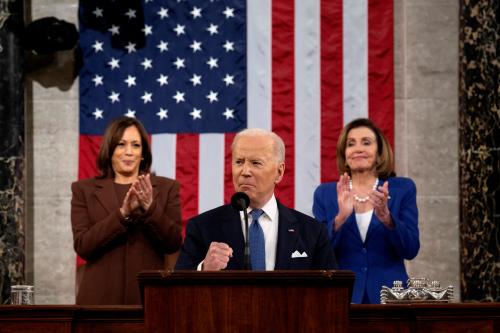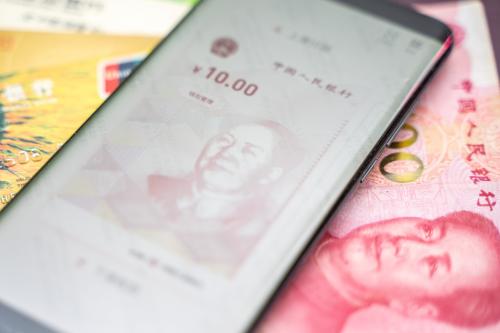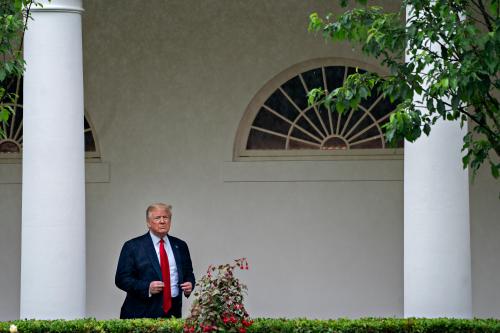A version of this article was originally published by The Washington Post on March 2, 2022.
As Russian tanks roll through Ukraine, the United States and its European allies are responding to Russia’s military aggression through a sweeping set of economic sanctions, including the unusual step of cutting Russian financial institutions off the global financial system by kicking them out of the Society for Worldwide Interbank Financial Telecommunication (SWIFT) system. Weaponizing the financial and payments system is working better than many predicted, and President Biden rightly took credit for his administration’s leadership in the State of the Union address on Tuesday night. Sweeping sanctions were the right opening strategy here. But our time working in government on sanctions issues also taught us that this approach poses clear risks—ones which the United States and its allies must prepare for and confront as the conflict drags on.
Although the war just began last week, this much is clear: It is being fought on parallel military and economic battlefields. Russia is far stronger militarily than economically — hence President Vladimir Putin’s decision to rely on traditional military measures that plays to his nation’s strength. The West’s decision to respond economically follows the strategy of attacking your opponent’s weakness while acknowledging that political and military reality makes a kinetic war between NATO or some of its members and Russia impossible now. The result is a sometimes bewildering volley of military and economic attacks taking place on the streets of Ukraine and in Russian and global markets.
Economic warfare is not new. Past economic boycotts and embargoes were designed to harm a country economically by stopping physical trade in an era before globalization and financialization took hold. The global war on terror relied on targeted sanctions aimed at specific entities and people and organizations, logical tactics for fighting terrorism. Steps like cutting Russian financial actors out of SWIFT are predicated on the notion that access to payments is a prerequisite for a nation’s economy to work these days.
In the blizzard of sanctions, why is SWIFT so important? Each country has a central bank that plays the role of payment system coordinator, networking that nation’s banks. In the absence of a global central bank, SWIFT in essence plays the role of coordinating between various nations’ central banks and the more than 10,000 banks around the world to process payments.
A payment requires the movement of both money and information. Information — who is paying whom, when and for what — is just as critical as the actual flow of money. SWIFT sends that information, allowing banks to make sense of the money that enters and leaves their accounts. Cutting key Russian entities out of SWIFT means the information flow stops; suddenly, Russian financial actors have no easy or universal way to move money.
The economic disruption for Russia from being cut out of SWIFT can be seen in the sharp, approximately 30 percent drop of the ruble, which occurred only after the SWIFT announcement. This happened even though Russia’s central bank sharply increased interest rates in an attempt to keep money in the nation. The sanctions from the West have both destabilized Russia’s currency and spiked internal interest rates there, seriously disrupting Russia’s economy.
American leadership is crucial in this financial war because of the dollar’s role as the world reserve currency. While some individual banks may find it lucrative to engage bilaterally with Russian counterparts, they will have to weigh that risk against potential retaliation from the United States. U.S. officials have the ability to cut off any financial institution’s ability to clear transactions in dollars. It is hard for banks in Russia or anywhere to exist without doing any business in the world’s reserve currency.
For all those reasons, and because of the interconnectedness of the world economy, the sanctions campaign against Russia is working surprisingly well — so far. But globalization also means that the casualties in such warfare can go both ways. Cutting Russia out of the economic system will reverberate internationally. The recoil will, for example, probably mean higher prices for gas everywhere, with all the other negative economic consequences that follow.
Will the American public be willing to accept these consequences at home in exchange for protecting the freedom of the Ukrainian people and the broader value of a stable global world order? How will European nations, individually and collectively, respond to even greater economic consequences given their dependence on Russia for energy? In the days ahead, the initially successful economic war will force the pro-Ukraine alliance to confront questions like these.
Like any form of war, its financial variant is a terrible thing to behold.
The answers will depend both on the magnitude of the economic consequences and on domestic politics within each country. Recent U.S. wars in Afghanistan and Iraq were long, with many casualties, but they resulted in relatively little direct economic upheaval at home. Russia’s small economic stature (it is less than 2 percent of global GDP) may mean relatively little lasting financial discord in the United States; more in Europe is likely because of Russia’s energy relationship. U.S. equity markets fell sharply when the war started, rebounded at the end of the week and were down Monday and Tuesday.
The United States also risks losing some control over the financial and payment system that we gained in part because of European instability in the 20th century—and that has supported our prosperity and power since then. China has been developing its own CIPS system as an alternative to SWIFT. Cryptocurrencies and blockchain technology offer banks ways to move payments without using dollars or SWIFT. The very success of the weaponization of the legacy financial system by the United States and its allies may drive Russia and others into an alternative, decentralized mode of finance that by its very nature will resist control by any government.
Like any form of war, its financial variant is a terrible thing to behold. The consequences for average Russians and likely many others around the world will be painful, although obviously not as much so as the munitions raining down upon Ukrainians. For that reason, we strongly support these countermeasures and the measured tone the president took about sanctions in the State of the Union. But any triumphalism about them today is as premature as last week’s pessimism.
The Brookings Institution is financed through the support of a diverse array of foundations, corporations, governments, individuals, as well as an endowment. A list of donors can be found in our annual reports published online here. The findings, interpretations, and conclusions in this report are solely those of its author(s) and are not influenced by any donation.








Commentary
Op-edEconomic warfare is hurting Russia. But it’s risky for the US, too.
March 2, 2022